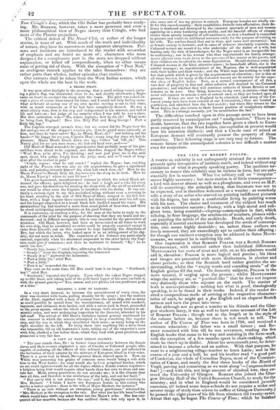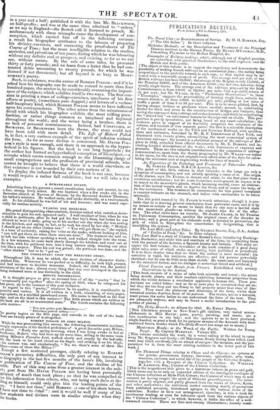THE LIFE OF ROBERT POLLOK.
A POETICAL celebrity is not unfrequently attained for a season on grounds quite irrespective of intrinsic merit, and indeed without any exhibition of what is properly speaking poetry. The qualities ne- cessary to insure this celebrity may be various in form, but are sub- stantially few in number. What the military call an " irregular" seems highly necessary ; but mere station is of little consequence-- a lord will answer almost as well as a ploughman, and even an M.P. will do something; the principle being, that literature was not to be expected, and is therefore welcomed as a wonder : as somebody tells a story of an artist who starved on painting indifferent pictures with his fingers, but made a comfortable living by painting worse with his toes. The choice and treatment of the subject has much to do with extensive success ; fluency, with a high moral and reli- gious tone, being essential—claptrap-commonplace in fact, which echoing, in finer language, the sentiments of numbers, pleases with• out puzzling the minds of the multitude. Death, and early death, especially if mental excitment has developed the seeds of consump- tion, also seems highly desirable ; as, unless these authors are timely removed, they are exceedingly apt to outlive their offspring : for though one eminent exception may be adduced in Satan MONT- GOMERY, we suspect he is outliving his sale. Our impression is that ROBERT POLLOK was a Scotch ROBERT MONTGOMERY, with national rather than individual differences. MONTGOMERY has more of strut and stilt, or, as his admirers would' call it, elevation : POLLOK is more logical and precise ; his ideas and images are presented with more distinctness, in shorter and closer periods; so that the Scottish bard rather gratifies the un- derstanding, whilst the "empty words and sounding strain" of the English genius fill the soul. On domestic subjects, POLLOs is the more natural, if verging upon the prosaic ; whilst MorrrnomsaT wings the midway air, so " poetical-like" that he does not impress very distinctly those who sojourn on the earth. The matter of both is unexceptionable : nothing but what is good, theologically speaking, is to be found in their works. Indeed, if the reader de- sired a compendious mode of arriving at the respective character- istics of each, he might get a fine English and an eloquent Scotch sermon and turn the prose into verse. But although not so great a wonder as his friends and the Glas- gow students fancy, it was as well to have some account of the Life of ROBERT POLLOK ; though not at the length or in the style of the volume before us, because there is not much to tell. The author of The Course of Time was born in 17'98, and received a common education : his father was a small farmer ; and Ro- BERT remained with him till he was seventeen, reading the few English books that came in his way and assisting in the farm-work, with the exception of a few months spent in chair-making, which trade he threw up in dislike. About his seventeenth year, he deter- mined to become a scholar and an author. With that purpose, he went to a neighbouring village-teacher to learn Latin ; and in the course of a year and a half, he and his brother read " a good part of Corderius, the whole of Cornelius Nepos, most of the Commen- taries of Ctesar, and nearly the first three books of the Eneid of Virgil, parsing and construing as we went along "—[unprecedented feat 1 ]—and with this, not large amount of classical lore, they en- tered the University of Glasgow. ROBERT also joined the Glas- gow Divinity Hall of the United Secession Church, to study for the ministry ; and in what in England would be considered juvenile exercises, (if indeed some boys-schools do not require a wider and severer range of study than seems to suffice at Glasgow University,) he passed the eight years of his life from nineteen till twenty-seven. About that age, he began The Course of Time; which he finished in a year and a half; published it with the late Mr. BrAexwoon, on half-profits ; and was at the same time admitted to " orders," as we say in England—the Scotch call it licensed to preach. Si- multaneously with these triumphs came the development of con- sumption, which carried him off in the following autumn : a result his biographer attributes to the labours of preparing his divinity-exercises, and correcting the proof-sheets of The Course of Time; but the more intelligible solution is, the studies, anxieties, and privations of ten years, during which he was labouring without any definite end or prospect, and existing, so far as we can see, without means. By the sale of some tales, he procured thirty or forty pounds; and we learn from a letter that he had con- tracted debts amounting to twenty pounds, for which he was dunned if not threatened; but all beyond is as hazy as MONT- GOMERY'S poetry. Such, in substance, was the career of ROBERT POLLOK : and if it be asked how his biography can be made to extend to more than four hundred pages, the answer is, by considerably overrating the import- ance of the subject; which exhibits itself in two ways. The first con- sists in printing a mass of college-exercises, specimens of his first efforts at poetry, (sometimes pure doggrel,) and letters of a verbose half-imaginary kind, which ROBERT POLLOK seems to have inflicted upon his correspondents. The other arises from the minuteness of detail with which his biographer exhibits the most trifling pecu- liarities, or rather things common to babyhood and boyhood throughout the world; and the writer being a brother, there is no- lack of personal reminiscences. Indeed, had CONFUCIUS, or SOCRATES, or SHAKSPERE been the theme, the story could not have been told with more detail. The Life of Robert Pulluk is, in fact, a very curious example of the spirit of inflation without the form. As far as mere diction is concerned, Mr. DAVID POI- Lox's style is neat enough, and there is no approach to the hyper- bolical in his figures. But the book is one long hyperbole ; for the author has formed an hyperbolical conception of his subject,—a mistake which seems common enough to the Dissenting clergy of small congregations and the professors of provincial schools, who cannot be brought to believe that there is a world elsewhere, or that existence is not bounded by their own notions of it.
To display the inflated flatness of the book is not easy, because it would require a rather full exhibition ; but we will take a few examples.
A. REMARKABLE INFANT.
Inheriting from his parents a sound constitution bodily and mental, he was a fine, strong, lively infant. He was baptised when a few weeks old, in the Secession church at Newton of Mearns, by the Reverend Andrew Thomson, his father's minister. He walked early, and spoke distinctly, at a twelvemonth old. In his childhood he was full of wit and humour; and was noted espe- cially for restless activity.
WEARING THE BREECHES.
His grand distinguishing characteristic, decision united with resistless deter- mination to gain his end, appeared early. I well recollect of him, when he was a child in petticoats, after he bad got his first boy's dress, but before he was allowed to wear it daily, going up to his mother one day when she was sewing in the kitchen, and saying to her, as he took his stand by her side, " Mother, I should get on my other clothes now." " You will get them on," she replied, in a tone of authority, raising her voice as she spoke, without looking at him, " you will get them on when these ones are done." The moment she said so, be left her side without speaking a word, and walked straight into the room. In a few minutes, be came back slowly through the kitchen, and went out at the door, with his petticoat torn into a long narrow strip, winding out after him like a serpent. Thus his end was gained; the petticoat was done, and the " other clothes " had to be " got on."
THE COMMENTARY UPON THE BREECHES STORY.
Throughout life, it may be added, the same decision of character distin- guished him. Whenever he was pushed or in difficulty, he took high ground, and had recourse to decisive measures. Indeed, the child was the perfect miniature of the man ; almost every thing that was ever developed in the man being indicated more or less distinctly in the child.
MINUTE INFORMATION.
It is thought proper to give an account here of all the " poetry " that he " occasionally put together " after the spring of 1816, when he composed his first piece, up to the summer of this year inclusive. In regard to this " poetry," whatever be its quality, it is considerable in 'nullity and variety. It is all written in a book, consisting of sixty pages, large quarto, in a marbled pasteboard cover. His name is inscribed on the first rage, and.on the third is this notice—" The little pieces which are written in his book are all in an uncorrected state." The fourth contains the following Latin motto-
" Non jam prima peto Mnestheus—" " Extremus pudeat rediise—" rhe poetry begins on the fifth page, and extends to the end of the book. Mere are twenty pieces of it altogether.
ROBERT POLLOK ON JOHN MILTON.
While he was prosecuting this survey, the following characteristic incident, trongly expressive of his decided preference e is great favourite poet, Milton, wk place. " Early one spring morning, when I was lying awake in bed at foorhouse, Robert, who had been up for some time, sitting in the same room !tiding Milton's Paradise Lost, walked slowly and erectly by the bed-side, ith the book in his hand closed on his finger, and striking it on his thigh, his custom was, said emphatically, " No, no, there's none of them like lilton—none of them like Milton!"
Except a Lbw scattered passages, chiefly relating to ROBERT 'OLLOK'S pecuniary difficulties, the only part of any interest in le biography is the last few months of the hero's life, involving le publication of The Course of Time, and the decline of his ealth. Part of this may arise from a greater interest in the sub- ct; part from Mr. DAVID POLLOK not having been personally )gnizant of much that took place ; so that he was compelled to .aw his information from others, who, not being such dabs at de- Sling as himself, could only give him the leading points of the ory. "I have not time," said ROBERT, :a one of his short letters, I have not time to detail" : and it would be well if many of his [low students and divines were in similar straights when they ire books.



























 Previous page
Previous page